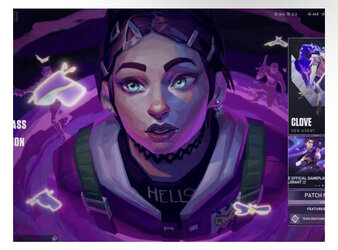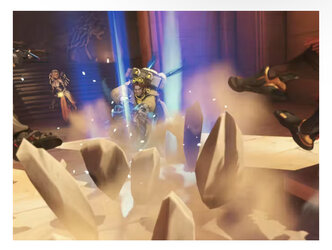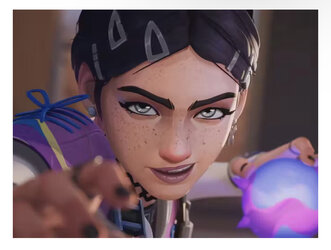Link (Archive)
This month saw Venture added to Overwatch, a non-binary hero with a drill that can dig deep underground before bursting through the surface to get the drop on their enemies. I’m a big fan of their design, and so is the community, judging by the oodles of fan art and discussions which have warranted more fanfare than the past three heroes combined.
My favourite part of the whole situation is how the community has immediately made Venture into a non-binary gremlin who loves nothing more than to explore caves and eat rocks. If that isn’t an absolute mood, I don’t know what is. Better yet, Venture is authentically cast with the talented Valeria Rodriguez providing their voice. And, according to their TikTok at least, they go by all pronouns and have been a passionate follower of the game since its launch back in 2016. I’m yet to give Venture a proper spin (dig?) in game, but from their identity alone I can quickly see them becoming a firm favourite, not to mention how I see myself in them, too.
However, recent weeks also saw another non-binary character debut as a playable hero in a popular shooter - Valorant.

Clove is a Scottish troublemaker with a luscious design and queer identity that isn’t dissimilar to that of Venture, so, of course, people have used this strange timing as a way to pit the two characters against one another.
Days after their respective releases, I’ve seen folks debating who “won” or can be labelled the best queer character. But this idea flies in the face of the fluidity that non-binary identities are supposed to represent.
It can be difficult to pin down what exactly non-binary means, because the term deliberately rejects being too tied to masculinity or femininity. People who decide to use this term to describe their identity often feel like they just don’t fit squarely into either of the boxes that society has demanded all people cram themselves into. But whether an individual decides to show themselves in a masculine or feminine light, they should never discount their non-binary identity.
It feels like as non-binary identification has become more commonplace in queer spaces, cis and queer people alike have inadvertently begun to try and define the term with parameters it's intended to deliberately subvert in the first place. There is no right way to present as non-binary, only a right way for society to respect those who do, regardless of how they’ve chosen to look or act. How non-binary people present themselves is none of your business, and we shouldn’t project weird expectations onto fictional characters either, since it only serves to highlight our own bias.

Regardless of which character design you prefer or if you have more fun playing as one or the other, this evaluation shouldn’t factor in their queer identity and have it unfairly used as some sort of slight against them. You can’t do non-binary identity better or worse than anyone else, and claiming you can only further cement internal prejudice from within queer circles that we could really do without.
While representation in video games is still progressing in significant ways, there is value to be found in depictions we view as flawed, or even problematic, as we figure out the right path forward. Pitting us against one another serves to widen this divide, and allows toxicity that permeates so much of gaming to slip into spaces which should otherwise be inclusive and welcoming.

Venture and Clove are both strong, fully-fledged, non-binary characters that represent the queer identity they stand for in dramatically different ways, but that doesn’t make one less or superior, purely because we might have a preference. If anything,
I love it when characters of this ilk aren’t afraid to lean into a feminine or masculine direction, or avoid it altogether, as it helps outsiders realise how big an umbrella non-binary identity can be. It doesn’t need to fit inside a strict box. No queer identities should, so stop turning Venture and Clove into enemies.
We Need To Stop Pitting Queer Characters Against Each Other
Queer representation is only getting better and better in video games. While we still have a long way to go in the real world when it comes to universal rights in the LGBTQ+ community, it at least feels nice that gaming allows us to be fruity and feel seen in our favourite characters.This month saw Venture added to Overwatch, a non-binary hero with a drill that can dig deep underground before bursting through the surface to get the drop on their enemies. I’m a big fan of their design, and so is the community, judging by the oodles of fan art and discussions which have warranted more fanfare than the past three heroes combined.
My favourite part of the whole situation is how the community has immediately made Venture into a non-binary gremlin who loves nothing more than to explore caves and eat rocks. If that isn’t an absolute mood, I don’t know what is. Better yet, Venture is authentically cast with the talented Valeria Rodriguez providing their voice. And, according to their TikTok at least, they go by all pronouns and have been a passionate follower of the game since its launch back in 2016. I’m yet to give Venture a proper spin (dig?) in game, but from their identity alone I can quickly see them becoming a firm favourite, not to mention how I see myself in them, too.
However, recent weeks also saw another non-binary character debut as a playable hero in a popular shooter - Valorant.

Clove is a Scottish troublemaker with a luscious design and queer identity that isn’t dissimilar to that of Venture, so, of course, people have used this strange timing as a way to pit the two characters against one another.
Days after their respective releases, I’ve seen folks debating who “won” or can be labelled the best queer character. But this idea flies in the face of the fluidity that non-binary identities are supposed to represent.
It can be difficult to pin down what exactly non-binary means, because the term deliberately rejects being too tied to masculinity or femininity. People who decide to use this term to describe their identity often feel like they just don’t fit squarely into either of the boxes that society has demanded all people cram themselves into. But whether an individual decides to show themselves in a masculine or feminine light, they should never discount their non-binary identity.
It feels like as non-binary identification has become more commonplace in queer spaces, cis and queer people alike have inadvertently begun to try and define the term with parameters it's intended to deliberately subvert in the first place. There is no right way to present as non-binary, only a right way for society to respect those who do, regardless of how they’ve chosen to look or act. How non-binary people present themselves is none of your business, and we shouldn’t project weird expectations onto fictional characters either, since it only serves to highlight our own bias.

Regardless of which character design you prefer or if you have more fun playing as one or the other, this evaluation shouldn’t factor in their queer identity and have it unfairly used as some sort of slight against them. You can’t do non-binary identity better or worse than anyone else, and claiming you can only further cement internal prejudice from within queer circles that we could really do without.
While representation in video games is still progressing in significant ways, there is value to be found in depictions we view as flawed, or even problematic, as we figure out the right path forward. Pitting us against one another serves to widen this divide, and allows toxicity that permeates so much of gaming to slip into spaces which should otherwise be inclusive and welcoming.

Venture and Clove are both strong, fully-fledged, non-binary characters that represent the queer identity they stand for in dramatically different ways, but that doesn’t make one less or superior, purely because we might have a preference. If anything,
I love it when characters of this ilk aren’t afraid to lean into a feminine or masculine direction, or avoid it altogether, as it helps outsiders realise how big an umbrella non-binary identity can be. It doesn’t need to fit inside a strict box. No queer identities should, so stop turning Venture and Clove into enemies.

